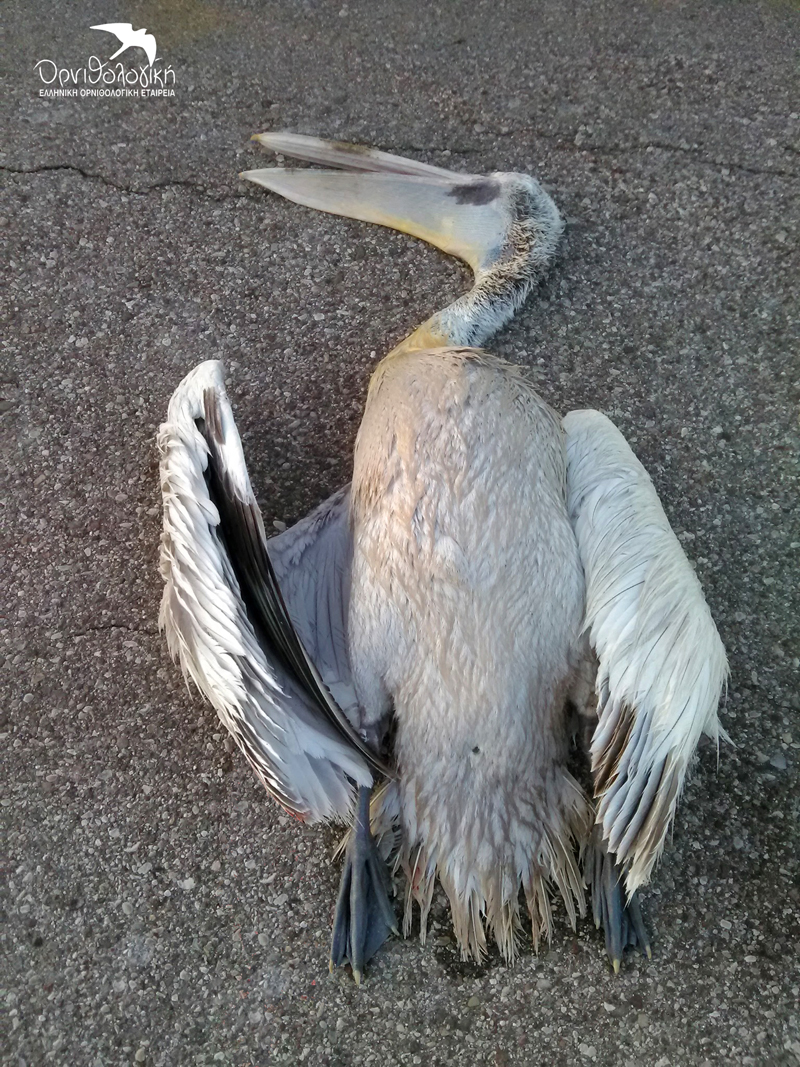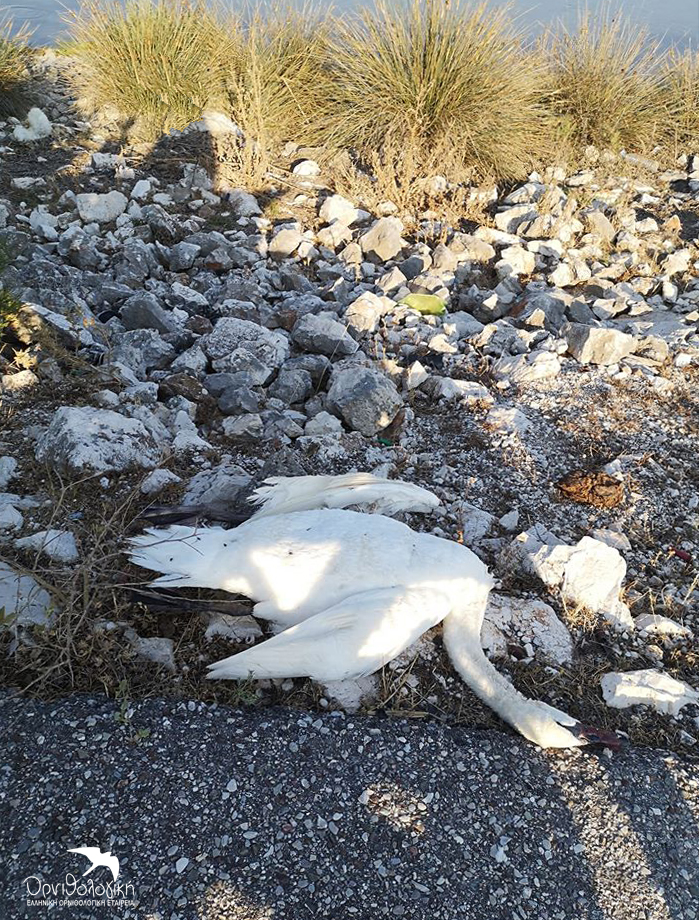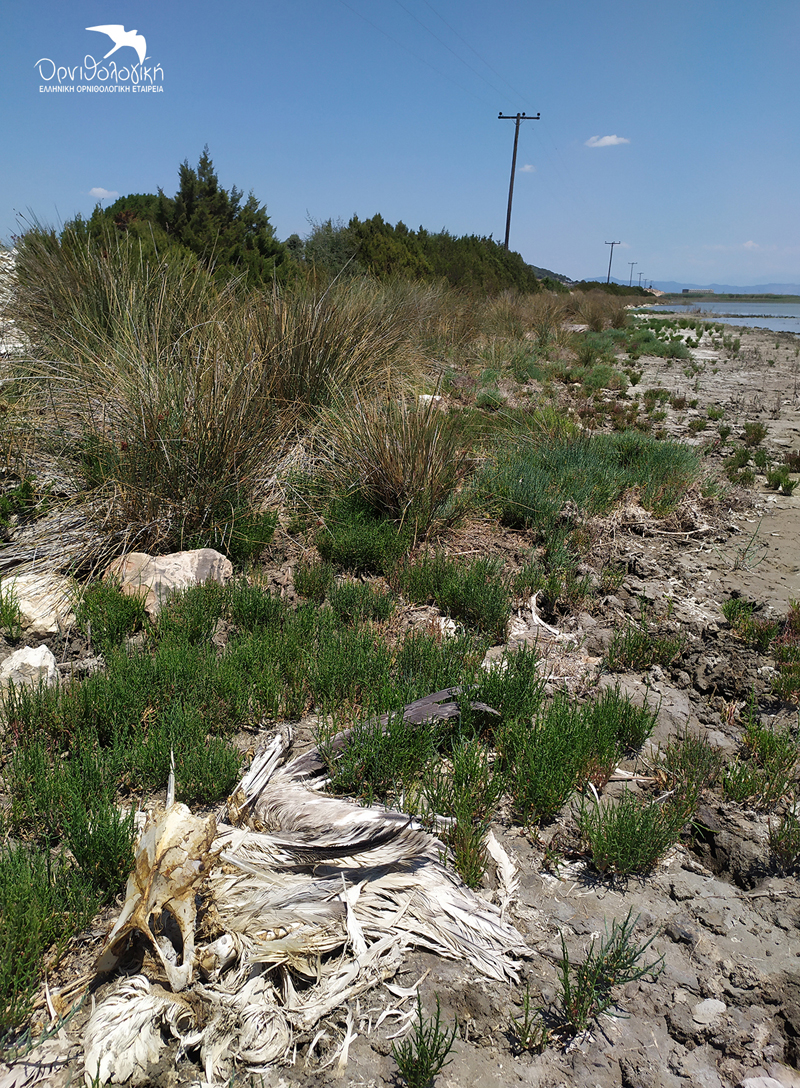During June, waterbirds belonging to protected species were discovered dead in three occasions, due to collision with power lines inside the protected area of the Mesolonghi Lagoon National Park, western Greece.

More specifically, on June 1st, after a local resident’s hint, a Dalmatian Pelican was found dead due to collision; on June 25th, a Mute Swan was also found dead due to collision; and on June 27th the remains of three Dalmatian Pelicans and a Greater Flamingo were discovered under power lines, suggesting death due to collision.
All these birds were discovered in the area near the pumping station, along the power network leading to Louros beach. This power line has already been deemed dangerous, because similar incidents, involving the killing of birds belonging to protected species, have happened before.
Tens of millions of birds are estimated that lose their lives due to collisions with electricity transmission networks in Europe. Collision, a cause of death different from electrocution, affects less agile birds and species migrating through the night, flying in groups at a height of 20-50 meters. These species include pelicans, cranes, flamingos, swans etc. In Greece, there is still a lack of consistent data concerning bird deaths due to collisions with power lines.
Hellenic Ornithological Society/BirdLife Greece, the Greek partner of the Pelican Way of LIFE Project, dedicated to the conservation of the Dalmatian Pelican, is monitoring selected powerlines in Mesolonghi Lagoon and Amvrakikos Wetlands areas. This Project began in September 2019 and is expected to run for 5 years. Actions under the Project will be implemented in collaboration with the local protected areas’ management bodies (Mesolonghi Lagoon and Akarnanian Mountains Management Body, and Amvrakikos Wetlands Management Body).
One of the Project’s objectives is the risk evaluation and mitigation of the power transmission networks affecting the Dalmatian Pelican. This action will run for one year in Mesolonghi Lagoon and Amvrakikos Wetlands, in order to locate critical points in which diverters will be installed in order for collisions to be avoided.

The conservation of the Dalmatian Pelican is no easy feat
One of the two pelican species encountered in Greece, the Dalmatian Pelican has an almost worldwide distribution from west Balkans to southeastern China. Its largest colony in the world is formed in the Prespa Lake complex, northwestern Greece. Other Dalmatian Pelican’s colonies are formed in Lake Kerkini and Lake Chimaditida (Northern Greece), Lake Karla (Central Greece), Amvrakikos Bay and Mesolonghi Lagoon (Western Greece).
Breeding of Dalmatian Pelicans in Mesolonghi lagoon was first confirmed in 2011 and now about 50 pairs nest in the area, mostly in the Klisova lagoon, but also on an islet in the main lagoon.
The Dalmatian Pelican is globally protected species and coordinated measures taken for its protection led to a gradual increase of its population. An International Action Plan for the species was adopted recently.
The Dalmatian Pelican is largely dependent on management measures for its survival. The species is also extremely sensitive during its breeding season, beginning in December and lasting through June for the colonies of the species in Greece. During this period of time, Dalmatian Pelicans must remain undisturbed, otherwise there is a high risk of nest abandonment and/or egg destruction as they attempt to avoid disturbance.

HOS/BirdLife Greece has issued a call to Mesolonghi Lagoon and Amvrakikos Wetlands residents in order to report any case(s) of dead birds near power lines. Please cite the exact location and send photographs to This email address is being protected from spambots. You need JavaScript enabled to view it., Tel.: (+30) 2108228704 & (+30) 2108227937.

The LIFE Project «Pelican Way of LIFE» (LIFE18 NAT/NL/000716) brings together seven partners from five countries who aim to implement conservation actions for the Dalmatian Pelican (Pelecanus crispus) in Europe and internationally. The Project will run for five years (09/2019 to 03/2025) and will be implemented in 27 Natura 2000 sites in Romania, Bulgaria, Greece and Ukraine, while supporting actions in Turkey, Albania, Montenegro and the Republic of North Macedonia. The project is coordinated by Rewilding Europe and in Greece the Project’s actions are implemented by HOS/BirdLife Greece.


